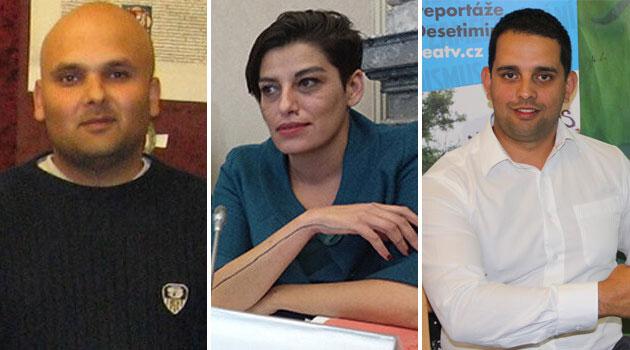Two more volunteer civil society members of Czech Govt Roma Council resign, civil vice chair post currently empty

The Czech Government Council for Romani Minority Affairs has recently undergone further personnel changes among its volunteer civil society members. Jan Husák has stepped down as vice-chair, while Edita Stejskalová and Petr Torák have resigned altogether.
Husák remains a member but is also considering resigning completely. Several volunteer civil society members of the Council and representatives of the nonprofit sector have been working intensively in recent months on the “Romani Integration Strategy 2021-2030”, which according to Czech Government Human Rights Commissioner Helena Válková should be signed by Czech Prime Minister Andrej Babiš in a matter of days and submitted to the interministerial commenting process.
Válková said she believed it was exactly the intensive work on drafting the Strategy that has caused Husák to resign as vice-chair and Stejskalová to resign altogether. “If the Strategy is approved in the form in which it has been prepared, then that will be an enormous step forward. On the other hand, unfortunately, as in any battle, one loses personnel, and I am quite sorry about it. Jan Husák, the civil vice-chair of the Council for Romani Minority Affairs, has stepped down from that position and unfortunately Edita Stejskalová has also resigned, who was in charge of drafting the analytical part of the Strategy, and I think she did her part of the work, even if there were certain points of dissonance,” she told ROMEA TV.
“They’ve simply had enough, from the perspective of different disputes, each for a different reason. They will continue to collaborate, but it will be difficult to replace them, and I would like to thank them,” Válková said.
Husák said his resignation as vice-chair is not associated with any specific situation. “I was elected the civil vice-chair by the civil society members of the Council after being a member for roughly three months, which never seemed absolutely correct to me, because I believed the vice-chair should be somebody who had been in service there longer. I accepted the position despite that, with all seriousness and responsibility,” he told ROMEA TV, adding that he had just perceived the post to be a temporary one until somebody else would take on the role.
“When that didn’t happen, I judged it appropriate to spend my time in a different direction, so I am mainly leaving for personal reasons that I would prefer not to mention,” the former vice-chair said, adding that he does not want to leave altogether while there is still work to be done and that does plan to attend the crucial negotiations associated with the Strategy. “Then I will see whether I will remain on the Council or leave, but I am rather inclined to leave after completing these tasks,” he said.
While Edita Stejskalová has not yet submitted her official resignation from the Council, she has already announced her departure to the Human Rights Commissioner. In an extensive statement published separately by Romea.cz, she has described her five years on the Council in detail.
Stejskalová perceives the most important aspects of her work on the Council to have been raising the subject of racial discrimination in the schools and establishing the Committee for the Fulfillment of the Romani Integration Strategy, of which she was chair. In her view, the previous Romani Strategy was ineffective and it is very important that the new one not end up being just as ineffective.
“The crucial question is what the Strategy will definitively look like and what tasks it will set the Government of the Czech Republic, or rather its ministries. Again, the social problem is being very strongly accented, more than the human rights problem, which is not exactly fortunate,” she told Romea.cz.
“The state actually does not accent the human rights level sufficiently. Combating antigypsyism must be at the center, supporting the emancipation of Romani people, supporting Roma with espousing their nationality. If the way in which politicians communicate the problem of discrimination or segregation never changes, not much will be achieved. It is necessary to ensure institutionally the way in which the Strategy will be fulfilled,” she said.
“I believe that after five years I must structure my time better and realize what can and cannot be done within the framework of an advisory body. I think that as a member of the Council I have exhausted the opportunities there and it is necessary to try different platforms,” Stejskalová said.
Petr Torák, a Romani man from the Czech Republic who emigrated to the UK and then worked there for some time as a police officer before retiring, has also expressed disappointment with his three years of work on the Council. “When I became a member of the Government Council, I had certain ideas of what I could achieve, how I could contribute my experience from abroad, but I realized one just runs into a wall there,” he told Romea.cz.
“Gradually I lost hope that the Council is able to achieve anything. Despite the fact that the Council is an advisory body to the Government, it seemed to me that our advice is not always taken absolutely seriously,” Torák added.
The Czech Government Council on Romani Minority Affairs has experienced many personnel changes on the civil society side during the last year and a half. Nine civil society members total have left during that time.
In June 2019 the civil vice-chair Martina Horvátová resigned her membership on the Council, and member Nikola Taragoš left with her. In September 2019, Jan Balog resigned.
Renata Köttnerová, Lucie Fuková and František Bikár resigned in January 2020 over the fact that Válková remained in her position as Czech Government Human Rights Commissioner. The Office of the Government then called on the public to nominate new members, and the Government appointed four new members in September 2020.
Less than two months later, two more significant members of the Council are leaving, while a third has left the civil vice-chair post. The Council prepares and approves standpoints for Government decisions and expresses its view during commenting proceedings on proposals made by various bodies that affect the area of Romani integration, approves regular annual analyses and assesses the position of the Romani minority in the Czech Republic, familiarizes the public with the Romani integration issue, and supports raising awareness and educating the public (not just the Romani minority), as well as contributing to preparing and assessing the Romani Integration Strategy that is in effect.
Civil society members on the way out
Mgr. Jan Husák
Bc. Edita Stejskalová
Petr Torák, MBE
Current civil society members
Mgr. Alica Sigmund Heráková
Iveta Theuserová, DiS.
Doc. PhDr. et PhDr. Martin Kaleja, Ph.D.
Bc. Tomáš Ščuka
Simon Slanina
Štefan Oláh
Čeněk Růžička
Josef Stojka
Bc. Zdeněk Guži
Alena Drbohlavová Gronzíková
Mgr. Petr Čáp,
Bc. Gwendolyn Albert
Ing. Vladimír Čermák
State members of the Council
Andrej Babiš, Prime Minister of the Government of the Czech Republic (chair)
prof. JUDr. Helena Válková, CSc., Czech Government Human Rights Commissioner (vice-chair)
PhDr. Martin Povejšil, Deputy Foreign Affairs Minister
Ing. Marie Bílková, Deputy Finance Minister
PhDr. Lubomír Zaorálek, Culture Minister
PhDr. Jana Horváthová, director, Museum of Romani Culture
Mgr. Michal Franěk, Deputy Justice Minister
Ing. Klára Dostálová, Deputy Regional Development Minister
Ing. Robert Plaga, PhD., Minister of Education, Youth and Sport
Jan Hamáček, Interior Minister
Mgr. Monika Šimůnková, Deputy Public Defender of Rights
Dipl.-Pol. Jana Maláčová, MSc., Labor and Social Affairs Minister
MUDr. Aleksi Šedo, DrSc., Deputy Health Minister
Václav Strouhal, DiS., Representative of the Regional Romani Coordinators
RNDr. Petr Pospíšil, Representative of the Union of Cities and Municipalities
Jiří Navrátil, MBA, Representative of the Association of Regional Authorities
